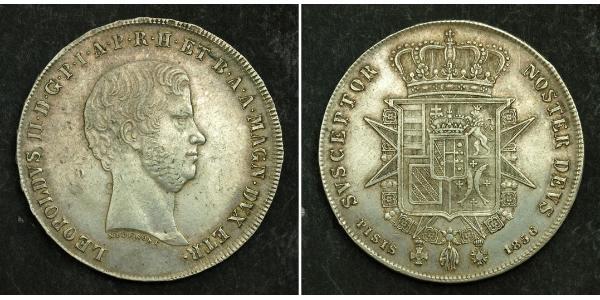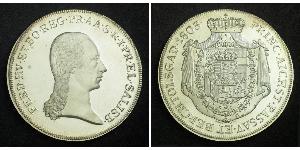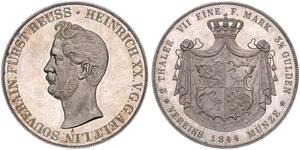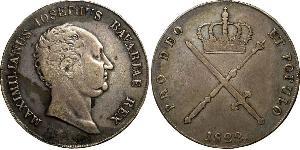(продана за $332.0)
1858, Tuscany (Grand Duchy), Leopold II. Large Silver Scudo (4 Fiorini) Coin. XF+
Mint year: 1858
Region: Tuscany (Italian State)
Denomination: Scudo of 4 Fiorini
References: Davenport 160, Montenuovo 331, KM-75b. R!
Condition: A dig, scattered tiny hits and scratches in obverse, otherwise a nice XF-AU!
Diameter: 40mm
Material: Silver
Weight: 27.5gm
Obverse: Bust of Leopold II of Tuscany right.
Legend: LEOPOLDVS . II . D . G . P . I. A . P . R . H . ET . B . A . A . MAGN . DVX ETR .
Comment: Engraver´s signature (NIDEROST) below bust truncation!
Reverse: Crowned coat-of-arms of Tuscany with a maltese cross in background, surmounted by Toison d'or (Order of the Golden Fleece) and two other orders.
Legend: SVSCEPTOR NOSTER DEVS / PISIS - 1858
Leopold II of Tuscany (Italian: Leopoldo Giovanni Giuseppe Francesco Ferdinando Carlo, German: Leopold Johann Joseph Franz Ferdinand Karl; 3 October 1797 – 29 January 1870) was Grand Duke of Tuscany (1824–1859).
He married twice; first to Maria Anna of Saxony, and after her death in 1832, to Maria Antonia of the Two-Sicilies. By the latter, he begat his eventual successor, Ferdinand. Leopold was recognized contemporarily as a liberal monarch, authorizing the Tuscan Constitution of 1848, and allowing a degree of free press.
The Grand Duke was deposed briefly by a provisional government in 1849, only to be restored the same year with the assistance of Austrian troops, who occupied the state until 1855. Leopold attempted a policy of neutrality with regard to the Second Italian War of Independence, but was expelled by a bloodless coup on 27 April 1859, just before the beginning of the war. The Grand Ducal family left for Bologna, in Papal territory. Tuscany was occupied by soldiers of Victor Emmanuel II of Sardinia for the duration of the conflict. The preliminary peace of Villafranca, agreed to between Napoleon III of France and Franz Joseph of Austria on 11 July, provided for the return of the Lorraines to Florence, but Leopold himself was considered too unpopular to be accepted, so on 21 July 1859 he abdicated the throne in favour of his son, Ferdinand. Ferdinand was not, however, any more acceptable to the revolutionaries in control of Florence, and his accession was not proclaimed. Instead, the provisional government proclaimed the deposition of the House of Habsburg-Lorraine (16 August).

|
Добавив:
anonymous 2015-11-22 |

























